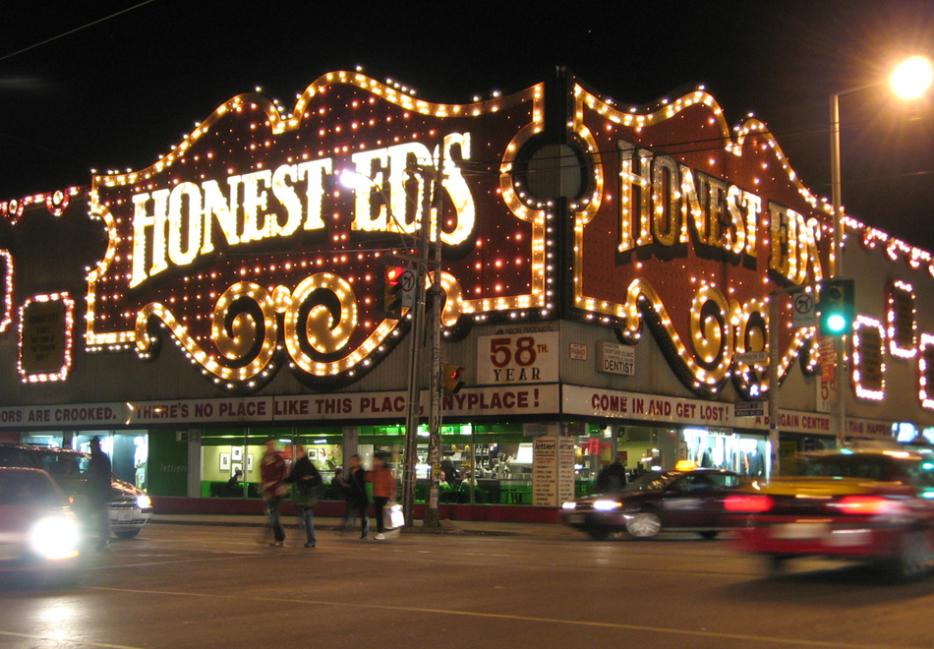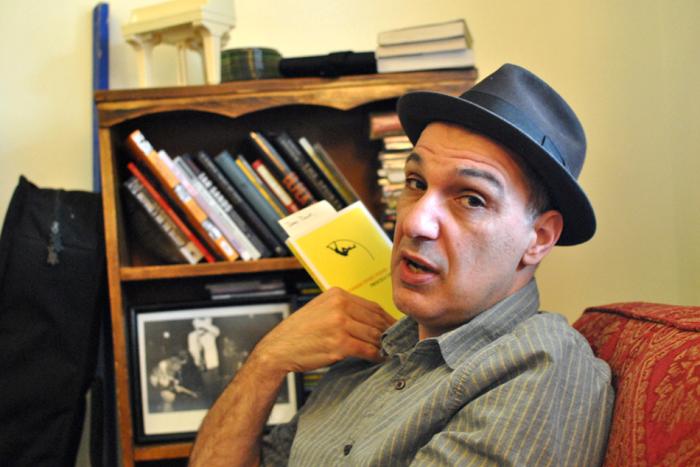Since I happen to be in the Galapagos right now, and since I haven’t been able to get David Mirvish out of my head since he announced the inevitable demolition of Honest Ed’s—his father’s investment in Toronto’s poor that turned into a temple of kitsch while never losing its essential utility—I’ve been thinking a bit about evolution. Looking at the flightless cormorant, a species endemic to these islands, makes me think a lot of us have evolution wrong.
We—or, at least, I—often think of evolution as a continual state of growth, improvement. Our growth-based economy seems based in it, and mostly, when we say that something’s evolved, we mean it’s gotten bigger and better.
But consider the flightless cormorant, with its vestigial wings. Evolving among islands that are 1,000 kilometres away from any other land mass, it didn’t become some sort of super-bird able to fly huge distances nonstop; it didn’t even become a pelagic bird, suited to living entirely at sea for weeks, months, or forever. It did what made most sense, which was to become a really good diver and swimmer, because, as the more sciencey among us know, evolution is actually about adaptation to one’s surroundings, rather than some sort of straight-ahead generalized improvement. And yet, as people, we always just want to be bigger and better than our parents. It doesn’t help that our parents want this, too.
So, born poor, Ed Mirvish set up a shop for people like him, people he felt comfortable with. It thrived, because most people—whether they like to admit it or not—don’t have as much money as is necessary to get everything they need, and for these people, two-dollar mixing bowls come in handy. Ed was famously a man of the people. As he got richer and richer through the 1950s and ‘60s, he maintained the mindset that had been drilled into him as a kid: cut corners, make ends meet, and, when possible, help others do the same. Hence, free turkeys at Christmas.
But as a result of his father’s good luck and hard work, David grew up quite differently. By the time he was 10, he was rich. His first business venture was an art gallery. As he said at the press event announcing his plans for the new “sculptures that people will live in” on King Street in downtown Toronto, he “spent his life travelling the world, looking at paintings.” Beautiful, refined, sophisticated. “I am interested in the theatre,” he said, “I’m interested in art, and I’m interested in architecture.” I’m sure his father, and perhaps especially his mother, the artist, were very proud: they had given their son the sort of opportunities to evolve that they themselves never had. But what have they given Toronto?
When David announced the sale of the land his father’s store sits on, including the remarkable Markham Street strip—an early inspiration of David’s, apparently, back when he was still thinking small, like his dad—it became clear that Mr, and Mrs. Mirvish bequeathed us merely one generation of popular appeal, of service to the poor. Because they were so successful, because they wanted the best for their son and were able to give it to him, we’ve got one more rich guy setting up a palace in the sky for other rich guys who want to live among the finer things.
You can make all the arguments for the popular appeal of art you like: all the Rembrandts in the world won’t get your kids their school supplies, unless you happen to own one of them—which David Mirvish does, and the rest of us don’t.
We don’t need Honest Ed’s anymore, one might think—that’s what Walmart is for. And true, Walmart will help with those school supplies for the people in Ed’s old neighbourhood when it opens on Bathurst. But one of the reasons people are getting upset about this Walmart, as they never did about Honest Ed’s, is because Mr. Walton’s not from around here. He doesn’t throw birthday parties for himself and invite the whole city in for cake. Barring a well-timed visit from a ghostly apparition, there are not likely to be any Christmas turkeys.
Some of us might be tempted to see the evolution of the Mirvishes of Toronto as a sign of the evolution of the city itself. We used to be humble and hardscrabble, but just look at us now—we’ve made something of ourselves. It’s time to evolve, time to pay attention to the finer things in life, the way they do in New York, in London, in Paris—in the cities we’ve always compared ourselves to, the cities into whose peer we now have a real shot at evolving. These are cities built by the children of the rich. The New York we know was forged by men like Solomon Guggenheim, son of Meyer, John D. Rockefeller Jr., son of John D. I love what they did with the place. They just priced me out of it.
As, of course, is their prerogative. But have you ever tried to get an apartment in London? David Mirvish wouldn’t have a problem. You probably would.
Cities don’t have to evolve into bastions for the 1%. They can remain livable, accessible to all. And Toronto’s one of the best at it. There are $1,500-a-month apartments in the middle of Rosedale and Forest Hill. Students live next to $2-million homes in the Annex. New York, Paris, and London are Great Cities, gorgeous to visit, perfect places for a second home. But Toronto’s something better. We can live with each other here. Ed Mirvish helped with that, but his son’s evolved to a higher purpose.
The flightless cormorant is a marvel. It doesn’t fly, but it is perfectly adapted to its place and purpose. It’s also one of the world’s rarest birds. When you see one, you know exactly where you are, because they’re unique products of their habitat. We had a shot at propagating the breed, but it looks like the line may have died out.






